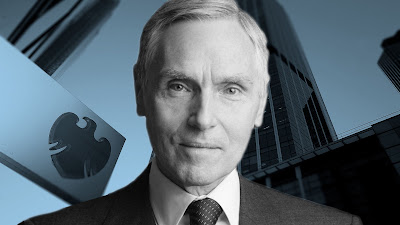Edward Bramson Shines a Spotlight on the Concept of the Free Market
We have examined the potential reconfiguration at Barclays before
in Financial Regulation Matters, and
in today’s post we will pick up on some comments made in today’s business media
ahead of Barclays’ AGM on Thursday. The focus and speculation surrounds that of
Edward Bramson, a so-called activist investor who many believe is aiming to
cause substantial change within the massive bank. In this post we will look at
Bramson more closely, and then discuss a concept that is being advanced as a ‘norm’
but which calls into question the very nature of the marketplace.
Edward Bramson has held
many positions as one might expect of a serious investor, but it is through
his investment vehicle Sherborne and Company that he is making headlines at the
moment. Through that vehicle he has amassed a 5.5% stake in
the bank and it is being reported across the business media that, tomorrow
(Thursday), he will ask shareholders to elect him to the Board of the bank. His
stated reason for this is that he wants to scale back the Bank’s investment arm
and force it to focus on areas of stability (and growth in part) in their
commercial and credit card departments. However, whilst sections of the business
press suggest that he is unlikely
to be elected to the Board, it has been discussed that there are concerns
around the performance of the investment arm and that his suggestions may carry
more favour than people expect. It is indeed a battle
for the ideology of the bank, with current CEO Jes Staley priming the bank
to take on the Wall Street elite, and Bramson wanting to change the focus
inwards. Yet, whilst the Financial Times
made the interesting
comparison between Bramson and the ‘Night King’ from HBO’s Game of Thrones,
there is an underlying issue that has been brought into the limelight that
forces us to ask what the economic reality is in today’s society.
Writing for the Financial
Times, John Gapper states that, since the Crisis, ‘regulators
are rightly cautious about how banks are run, and would look sceptically on an
abrupt change of strategy pushed through by a maverick’. This declaration
is interesting for a number of reasons. Firstly, yes it is right that
regulators be cautious, but on the same day that regulators have allowed Lloyds
to reduce
their capital buffer, it is difficult to see complete consistency in this
cautious approach. Yes, the two are very different, but the issue is that
regulators are not necessarily equipped to run a multinational bank, so is it
correct that they may have the opportunity to define the approach taken by one
of those banks? Regular readers will know that the approach taken here in the
blog is certainly not one of brazen free-market capitalism, but the suggestion
made by Gapper is not insignificant. This is a leading financial media outlet supporting
Staley’s view of taking Barclays further into Wall Street – but, is he right in
doing so? The performance of the investment arm suggests not, but this is
counteracted by the widely held belief that a diversified bank is better
equipped to deal with storms. That may be widely believed, but that does not
make it the only approach. It is unlikely that Bramson will be successful in
the AGM, but the media coverage of this issue demonstrates a wider problem
whereby massively impactful decisions are being guided by journalists and
potentially rubber-stamped by regulators who may not, necessarily, have the
expertise to make such decisions in the private
bank’s business.
Keywords – Edward Bramson, Barclays, Banking, Business, @finregmatters





Comments
Post a Comment